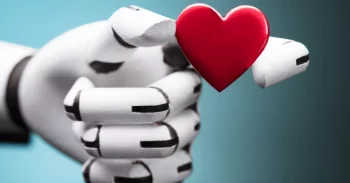Artificial intelligence, more commonly known as AI , is the set of methods and techniques that allow a machine to simulate human intelligence, particularly in terms of reasoning, learning, perception, planning, pattern recognition and natural language understanding.
There are two types of AI, namely weak AI (also basic AI), used in specific tasks like speech recognition. And strong AI (also general AI), designed to solve complex problems and simulate human behaviors.
Many fields use AI such as medicine, finance, transportation, robotics and many more. Its complexity is such that it questions the ethical implications, safety and its development.
The power of Artificial Intelligence
The main strength of AI is its plurality. Indeed, it makes it possible to improve all types of usual operations. Some researchers are even working to develop AI systems that can understand and respond to human emotions .

Currently, AI is present in the development of self-driving cars. Likewise in robotics in order to make possible tasks that were previously only achievable by humans.
The field of computer science uses it in automatic natural language processing (NLP) which allows computers to understand and respond to human language. She can also analyze and process images to produce very realistic works.
In addition to all this, artificial intelligence is used to improve the accuracy of forecasts in multiple areas such as weather, finance and sports. Expert groups believe that AI is meant to improve our lives, both in providing better healthcare and in broader aspects such as global warming .
Artificial Intelligence may also encounter resistance
Some experts warn against the risk of large-scale job losses that the emergence of different artificial intelligences can cause. The latter can perform tasks previously performed by humans. There are also concerns that it could create autonomous weapons . This could make war more destructive and unethical.
Experts also point to its misuse. Indeed, the Deep Face uses it to imitate a person’s face. This was the case, for example, with the fake video of Ukrainian President Volodymyr Zelensky which was broadcast by a Ukrainian news channel, victim of a hack.
On top of all this, questions arise whether the AI makes discriminatory decisions or can be used for surveillance as well as phishing attacks for hackers.
Despite all these fears, one of them rises to the top of all in terms of concern; it is about the fact that eventually, AI systems could become so powerful and autonomous that they would be difficult, if not impossible, to control by humans .
Reluctance far from being generalized
However, some experts argue that AI has the potential to dramatically improve our lives by increasing the efficiency of certain processes. It deals with the complex problems facing the human species.
AI has the potential to create new jobs and new industries . For example, the development of self-driving cars could create jobs in software development or data analysis.
It improves health care by helping doctors make more accurate diagnoses for better treatment. Including education by providing personalized learning experiences. This helps teachers identify and resolve learning difficulties.
Generally, it can solve some of the problems , such as climate change. In particular by improving all of our means of transport, their logistics as well as the delivery services which emit millions of tonnes of CO2 each year.
Thus, it seems wiser to review the risks associated with the emergence of AI. However, it is also a way for current workers to train for the challenges of tomorrow and to simplify their upskilling in many areas.

